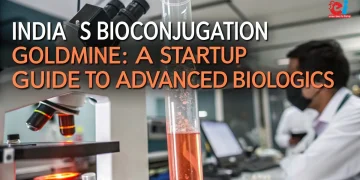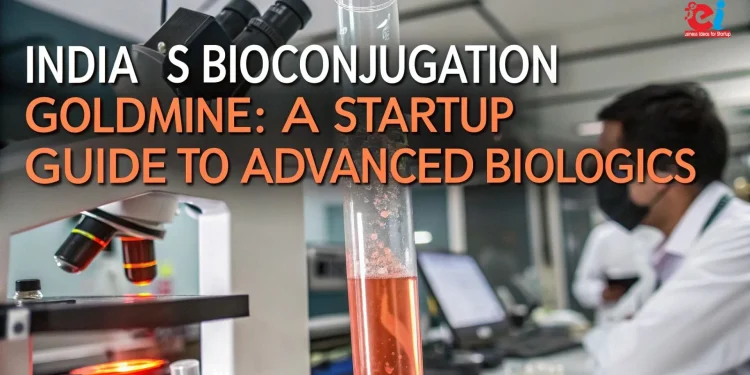Biologics and bioconjugation exemplify the growth potential of life sciences. Chemical Weekly’s June 3, 2025 issue reported on Shilpa Biologicals’ expanding bioconjugation capabilities in its Dharwad facility, which confirms India’s global value chains focus strategy shift toward Advanced biologics and conjugated pharmaceuticals.
Indian entrepreneurs and biotech startups view this as more than mere corporate news: it is an insight into some of the most promising sectors in bioconjugation and biotechnology.
Technological development of therapeutics relies heavily on bioconjugation—the coupling of drug molecules to proteins, peptides, or antibodies, and even to dyes or polymers. It starts from antibody-drug conjugates (ADCs) in oncology to biosensors and diagnostic tools; the field is teeming with opportunities.
The aim of this article is to examine supporting data and trends on emerging business strategies to unlock this bioconjugation opportunity for startups and capitalize on the profit potential of this biotechnology goldmine.
What is Bioconjugation?
Bioconjugation is the area that deals with the chemical linkage between two molecules, usually a biomolecule and a synthetic molecule. Common conjugates include:
- Antibody-drug conjugates
- Protein-polymer conjugates
- Enzyme-substrate linkages
- Bioimaging probes
These conjugates enable more accurate therapies, advanced drug delivery, and better diagnostic imaging.
Related: Personalized Skincare: How AI and Biotechnology Are Reshaping the Cosmetics Industry
Applications of Bioconjugation
Antibody Drug Conjugates (ADC)
These are applied in the management of cancer to combine the selective action of antibodies with the lethal action of chemical agents.
Biosensors and Diagnostics
Detection of diseases can be done with the use of labels that are radioactive or fluorescent tagged to antibodies or enzymes.
PEGylation
Attaching a chain of polyethylene glycol (PEG) to proteins or peptides to increase their half-life and solubility of the resulting compound.
Theranostics
Combined of diagnosis and therapy systems constructed from bioconjugates.
Nanoparticle Functionalization
Labeling ligands or drugs onto nanoparticles for precise delivery.
Market Outlook and Growth Drivers
The bioconjugation market across the globe is estimated to reach $6.5 billion by 2023, with an estimated annual growth of 12–15% for the next decade. The acquiring and emerging companies such as Shilpa Biologicals, Dr. Reddy’s, and Biocon are entering the field, with domestic markets from India set to ignite innovation and contract manufacturing needs from global biopharma.
Key Growth Drivers:
- Increase in focus therapies in oncology
- Rising application of bioconjugates in precision imaging diagnostics
- Advancements in linker and payload technologies
- Growth of contract services for biosimilars and ADCs
- Increased adoption of personalized medicine
Related: India’s Biotechnology Sector
Shilpa Biologicals: A Case in Point
In Chemical Weekly of June 3, 2025, Shilpa Biologicals has added bioconjugation modules to their Dharwad facility which has furthered surgical oncology bioprocessing.
This bolsters the national infrastructure to biologics 2.0 and serves as an inspiration to other bio startups to consider highly specialized value-added biologics production technologies.
This plant has now got the capabilities for undertaking research and development, as well as commercial production of antibody drug conjugates, therapeutic proteins, and diagnostic conjugates, which positions it as a potential offshore development center hub for biotech companies around the world.
Opportunities for Startups
Development of ADCs
Startups could concentrate on developing new proprietary antibodies for anti-soluble tumor-associated glycoprotein linkers and constructing proxy frameworks.
CDMO Services
Provide contract development and manufacturing of bioconjugation services for other biotech and pharmaceutical firms.
Diagnostic Kits
Use enzyme or antibody based conjugates for rapid diagnosis of infectious diseases, cancer, and metabolic disorders, and arm them with additional functions.
Diabetes Test Strip
Innovate in biosensor under the guidance of supportive policies in the nanotechnology lab for continuous and real-time monitoring of glucose levels.
Custom Linker Technology
Devise new linkers that are cleavable and stable, enhancing payload delivery while alleviating off-target interference.
Investment and Regulatory Landscape
As with other ADC products, bioconjugation ADCs are classed as biologics and therefore attract specific regulatory oversight from India’s CDSCO and FDA/EMA internationally.
Startups also need to be compliant with GMP, ICH Q6B, and biosafety policies. There is significant investment required in quality systems, analytical characterization, and regulatory frameworks.
Government Support
- BIRAC provides assistance for BIG and SBIRI schemes.
- Advanced biologics, including ADCs, are included under PLI schemes for biopharmaceuticals.
- Karnataka, Telangana, and Gujarat state biotech parks provide plug-and-play facilities.
Challenges to Overcome
- Extended development timelines paired with high R&D costs
- Trained personnel coupled with advanced analytical technologies are essential
- IP complexity for payloads, antibodies, and linkers along with licensing are challenging
- International market access involves complex regulatory navigations
Conclusion
Bioconjugation is beyond a laboratory technique; it serves as the pinnacle for advanced biologics and diagnostics. Startups are well-positioned to take advantage of the biotech boom with increasing global demand and India’s rapid evolution into a strategic manufacturing hub.
CDMO services and personalized diagnostics innovation highlight a spectrum of opportunities in bioconjugation that are awaiting visionary entrepreneurs.
The growth of Shilpa Biologicals is a signal for new businesses to enter this emerging and impactful field. Through scientific creativity, quality compliance, and deeper understanding of the market, bioconjugation can transform into a self-sustaining industry for India’s innovative spirit.


















